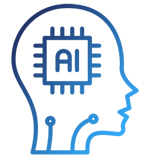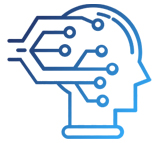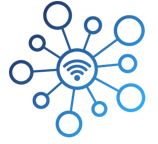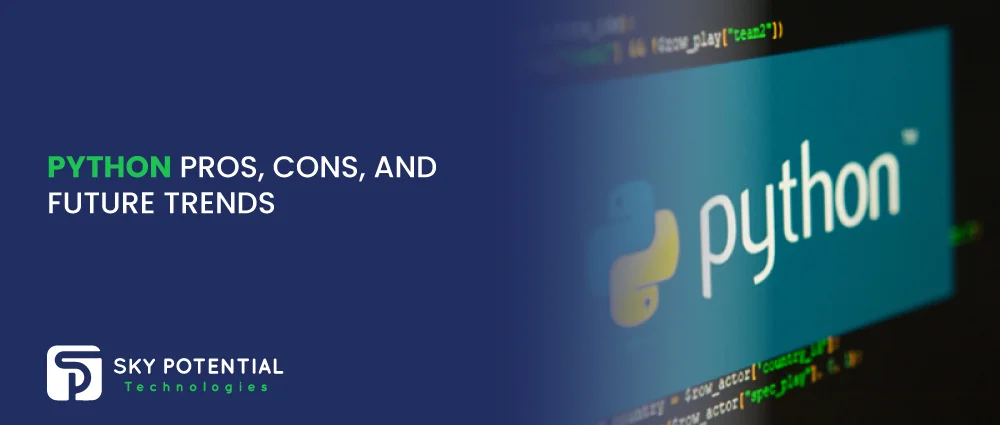- AI

Artificial Intelligence

Smart Products & Services
We follow Smart Products & Services

Intelligent Business Functions & Processes
We follow Intelligent Business Functions & Processes

Robotic Process Automation
We follow Robotic Process Automation

Personalized
healthcareWe follow Personalized healthcare

Identifying at-risk patients
We follow Identifying at-risk patients

Optimized routing and scheduling
We follow Optimized routing and scheduling
- ML

Machine Learning

Predictive
AnalyticsWe follow Predictive Analytics

Service Personalization
We follow Service Personalization

NLP
We follow NLP (Natural Language Processing)

Stock Market Forecasting
We follow Stock Market Forecasting

Fraud Prevention
We follow Fraud Prevention

Recommender engines
We follow Recommender engines
- blockchain

Blockchain

Public Blockchain
We follow Public Blockchain

Private Blockchain
We follow Private Blockchain

DEFI
We follow DEFI Blockchain

Initial stake pool offering development
We follow initial stake pool offering development
- IOT

Internet of Things
- AR
- Business Solutions

Business Solution

Business Performance Management
We follow Business Performance Management

Decision Making & Big Data Analytics
We follow Decision Making & Big Data Analytics

Enterprise Data Management
We follow Enterprise Data Management
- Apps

Apps

Native Apps
We follow Native Apps

Cross Platform Apps
We follow Cross Platform Apps

Web Apps
We follow Web Apps

Hybrid Apps
We follow Hybrid Apps

Cloud Native Apps
We follow Cloud Native Apps
- Lab

Python Pros, Cons, and Future Trends
Developers worldwide agree that Python is one of the best programming language and is highly trendy in enterprise software development. It is flexible and easy to use with a strong community. You can easily get help from professionals.
But you must consider the downsides that go together with its benefits like python’s processing speed limits, can be a problematic in some situations.
So, to learn more about these and help you decide if it is right for you, let’s look at the pros and cons of Python.
What is Python’s primary use?

Python has been a backbone in enterprise software development for almost 30 years.
It’s famous because it’s a high-level, dynamically typed language. You can make web apps, mobile apps, ML and AI tools, or even video games.
Python is most useful for web programming and data science. Most big companies go for Python. These are Google, Facebook, Microsoft, Spotify, Instagram, and Uber on all their services.
Startups with time limitations and money but still want to make great goods find comfort in Python. Django’s free, open-source Python framework is ideal for speedy enterprise software development.
Django was created with the idea of DRY (Don’t Repeat Yourself). Its clean, practical design speeds up development and lets workers focus on the specifics of each project. It’s a strong base that eliminates the needless repetition of boilerplate code, making it essential for companies.
Python is popular with people from all fields, from accountants to scientists and, of course, in enterprise software development and app development. Its ease of use makes it a friend to everyone, making it easy to incorporate into a wide range of processes.
Is 2024 a year enough to learn Python?
Learning Python is very useful even in 2024. Why? Python is supportive of all new tech like AI, ML, NLP, etc. Its other good qualities are that it is simple, easily understandable, and highly flexible. Python can be very helpful in data science, enterprise software, and web or web app development.
Python is a strong language for building complex apps. It is widely used in enterprise software development. It has extensive support libraries and a busy community of over 8 million developers worldwide. This ensures that users can get help and that it is constantly improving.
Python is still useful in 2024 because it is used in popular tech areas like web scraping and embedded systems development. Although it has some problems compared to other languages, its pros outweigh its cons.
Python’s open-source nature and large community, which includes the Python Package Manager, make development easier, even if you sometimes use other languages. Python is still very useful in enterprise software development. It drives innovation and powers solutions across all fields.
Sky Potential US has expert Python developers who can provide your business with pioneering IT solutions based on your specific core industry needs. So, boost your enterprise with our custom software development services in the USA and Python-driven innovation.
What are the pros of Python?

Here are some of the most fundamental advantages of Python: –
Versatility
Python is a programming language known for being easy to read and flexible.
This tool has a simple learning curve and many features—a suitable choice for beginners and enterprise software development experts.
Its flexibility allows for quick development and ease of use. Settings like Jupyter Notebooks make it the ideal choice for data scientists.
Vibrant Community
Python is an open-source language that shows how the computer community works together.
Python has a large and active community of developers who are always coming up with new ideas and sharing what they know.
Enterprise software development moves more quickly because it is easy, and the community offers abundant resources.
Abundant Libraries
Python’s large library ecosystem covers almost every need in enterprise software development, from machine learning and web and mobile development to more.
This vast collection of resources opens up a world of options for developers, letting them develop new ideas and custom solutions for a wide range of business problems.
Flexibility
Python’s flexibility makes exploring complicated legacy (old) data simple. This, in turn, makes it stress-free to find difficult-to-find insights.
It supports a variety of writing styles. It also combines, without any problems, object-oriented and functional programming features.
Thus, developers can use various programming styles to solve glitches in enterprise software development fruitfully.
Prototyping
Python is helpful because it can do more with less code, which makes it perfect for rapid prototyping in enterprise software development.
With asynchronous coding, writers can make changes quickly, test their ideas, and create GUIs with little work.
Python is a vital part of current enterprise software development projects because it is flexible and saves time and money on development.
Simplicity
Some say that Python’s main feature, ease, is good and bad. But is being simple a weakness?
Instead of being a weakness, Python’s ease is one of its best features. It makes it easy for newbies to start and keeps the learning curve low.
One says, “With great power comes great responsibility.”
Like every other programming language, Python has traits that make it better than others.
A Software Engineer at Volvo IT named Łukasz Kuczyński states that being simple is not a weakness. But it is a strength where you have a solid base when working on a development project. It makes it easy for programmers to move around in projects.
What are the cons of Python?

Threading
Threading is a problematic part of Python, mainly because of the Global Interpreter Lock (GIL). This prevents multiple threads from running simultaneously.
Mateusz Opala, Netguru’s Machine Learning Leader, states that apps relying heavily on CPU resources experience slower performance.
There is a way to fix this, and that is by multiprocessing ahead of multithreading.
This limitation can be controlled well via pre-existing Python packages, like those for data handling.
Memory Consumption
You should pay attention to its memory usage during enterprise software development using Python.
This can be problematic in situations where there are a lot of active items in RAM.
The problem typically comes from garbage collection needing to manage memory better. This leaves memory allocations in place for too long.
Refactoring can fix these errors. But it’s essential to be aware of likely memory overheads when at work with Python.
Speed Limitations
As discussed in intro section that by its very nature, Python works more slowly than other languages because it is an interpreted language.
However, Python can still be a good choice if speed isn’t the most crucial factor for your project.
Mobile Environment Compatibility
Python isn’t built to work with mobile environments, unlike languages like Java or Swift, which officially support Android and iOS. This makes it hard for coders who want to work on mobile computing projects, as more work needs to be done when working with Python, like using third-party tools or libraries to adapt Python.
Cross-platform programming is possible due to strong libraries like the Kivy framework that works on Android, Windows, Linux, and even Raspberry Pi.
This adaptability makes Python a feasible option for various projects, and according to Reshetniak, using these libraries is relatively easy.
Python future predictions and Trend’s

If you imagine Python’s future, you can see several interesting trends and expectations that will shape its path.
One big change is serverless Python development. It is becoming increasingly popular in custom software development services, especially for scalable apps and serverless design.
Many developers are using AWS Lambda and Azure Functions frameworks. They want to build serverless apps that are lightweight, event-driven, and scalable.
Microservices design is still the most popular method today. It stresses the importance of flexibility and scalability.
Developers can quickly make changes and scale specific components as needed. They can break applications into minor services that can be deployed individually.
Software systems adapt to new needs and better technology with these adaptability features.
But still, Python is the best language for creating microservices. It is simple to use and can also be broken down into modules.
As tools like Flask and FastAPI become more popular, Python becomes critical for providing flexible and scalable microservices solutions.
AI-driven programming is an area where Python is becoming a powerhouse. More than ever, AI is now the building block of any software.
The mixture of natural language processing (NLP) with AI-assisted coding tools that Python drives is making developers more productive.
When AI and Python come together, they should make enterprise software development well-organized and open to new, never-before-imagined ideas.
In 2024, Python is still the most prevalent language for AI, ML, and data science. More coders/programmers and developers are using and updating libraries like TensorFlow, PyTorch, and Scikit-learn. This strengthens Python’s place in forward-looking technologies even more.
With libraries like Pygame and Panda3D, Python’s addition to game development makes gamers more creative.
Moreover, the tools and SDKs for AWS, Google Cloud, and Azure show Python’s ability to work with cloud services. Python works well with these platforms, making scalable, cloud-native apps possible.
With support from the Python Software Foundation and the focus of the Python community on sustainability and efficiency, Python will continue to be the front-runner in the future of enterprise software development services.
Is Python a helpful programming language for any of your upcoming projects?
Python stands out as a strong option when considering your custom software development choices. Tech giants like Google, Facebook, and Microsoft use it, which shows that it’s reliable and easy to expand.
Developers worldwide love its simplicity, flexibility, and completeness, which makes it a popular choice for many projects.
Python is great for AI-first businesses because it excels at machine learning, data analysis, and graphics.
Python, like any programming language, has its strengths and weaknesses.
However, as demonstrated, it can be an excellent choice for many projects. Its versatility, readability, and extensive libraries make it a powerful tool for many use cases.
While there may be better fits for some projects, Python’s flexibility and community support often make it an ideal choice in many scenarios.
Call us now to get our custom software or web app development services and build an application with our Python expertise.

















































Leave a Reply